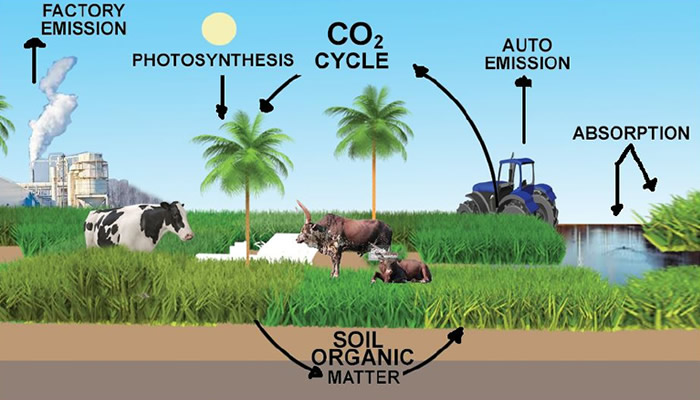Read in
Although concerted efforts have been made, Nigeria is still seen as a carbon-dependent economy. Many businesses still run on generators, in addition to other practices that harm the environment.
A low-carbon economy, experts note, is a system that tries to reduce greenhouse gas emissions while operating as a conventional economic system.
This structure represents the long-term objective of nations attempting to mitigate the effects of climate change by building sustainable ways to run a better and greener economy.
The transition to low carbon economies began with the Kyoto Protocol, which required governments to cut their carbon emissions and continue with the Paris Agreement of 2015.
In the face of the climate crisis, farmers can strengthen plans to remove greenhouse gases in the atmosphere through carbon farming.
A Rivers State-based climate change advocate and engineer, Mr Miracle Morgan, noted that there were several carbon removal techniques that relied on large-scale technological infrastructure.
According to him, carbon farming is only one of the ways excess carbon can be removed from the atmosphere.
“What sets carbon farming apart from other infrastructure-based mitigation strategies is its capacity to develop landscapes beyond carbon storage, with added benefits for people and the environment,” he said.
Research by SourceTrace, a climate-forward online resource, stated that carbon farming had a great potential to cultivate wide scale benefits beyond agriculture.
According to the resource, a big reason why carbon farming is attractive to land managers is due to the immediate and long-term impacts it can provide for land.
“Farming strategies that foster landscape-wide carbon storage also provide in-farm co-benefits for income, farm productivity and soil health, among others,” SourceTrace added.
How carbon farming works
There are several positives of carbon farming. The technique emphasises adapting sustainable methods that predominantly enhance the absorption and retention of carbon from the atmosphere into productive lands.
This unlocks the natural capacity of land to help draw down carbon on a large scale.
An environmental science researcher based in Germany, Dr Usmanu Dauda, said carbon farming was a cyclical process.
He added that the soil, water, air, sunlight, plants and nutrients affect one another in a typical crop lifecycle.
According to him, while carbon farming focuses on emission reduction and removal, it also creates a whole array of other beneficial effects with direct and indirect outcomes for farmers and farm productivity.
He noted that carbon farming provides a unique opportunity to manage land more strategically with added benefits in various socio-economic and environmental aspects.
Dividing the potential carbon farming co-benefits into three, the researchers said it was important to keep in mind that each farmland was unique, adding that its co-benefits might vary from operation to operation.
On the environmental benefits, Dauda listed soil health, soil conservation, improved structure and stability, irrigation efficiency, nutrient availability, water and moisture retention, adding that it also helps to improve water quality by preventing nutrient runoff.
Dauda added, “It enhances the habitats for specie richness, supports complex ecosystem structures and helps to manage plant diseases and pests. It is less reliant on harmful chemical inputs and uses effective and sustainable waste and pollution management.”
On its economic benefits, Dauda listed skills and knowledge development, employment creation, community participation in nature building and cooperation between various sectors in society for a sustainable future.
He added, “Carbon farming expands income opportunities for the farmers. It also saves cost from reduced inputs and fuel efficiency. Also, because of how sustainable it is, it makes it easier to manage farm productivity on a long term.
“Carbon farming has a great potential to generate diverse positive ecological impacts as it innately promotes environmental stewardship, especially on soil health. This is why, for some, sequestering and storing carbon by managing arable land through carbon farming is considered a nature-based solution.”
NBS are methodologies that incorporate nature or natural processes for creating sustainable solutions to challenges such as climate change.
An agronomist and climate change teacher at the Finima Nature Park, Rivers State, Mr Emmanuel Ude, noted that farming practices such as cover cropping, crop rotation, reduced tillage, and reduced use of chemicals in the farm are also tenets of regenerative and sustainable farming.
He added that carbon farming also provides several other advantages that may not be present in other land management systems for agriculture.
According to him, accuracy and incentives are keys to successful carbon farming that maximise co-benefits.



